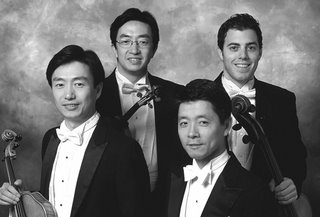 The Shanghai Quartet is an institution at the Freer/Sackler Gallery by now – and they are not only regular guests in Washington but also a chamber-music highlight of the season. The proved to be so much in the first movement of Barber’s String Quartet op.11, which has the tantalizing quality of keeping you on your toes, always apprehensive of what might come next – but always rewards with rich, unexpected beauty. On top of that it has plenty rhythmic drive. In short, the two-movement quartet – at least in the hands of the Shanghai Quartet – impressed far beyond what one might expect from a work that had the unfortunate fate of getting its slow movement culled and transmuted into the (usually saccharine) “Adagio for Strings”. Of the latter, any self-respecting ear will grow tired, soon. As part of the String Quartet, however, it (thankfully) takes on a “new” guise: Delicacy and haunting tones instead of the listener being smothered with syrup. (Even if you still think you’ve heard that work too many times, it’s worth it just for that first movement.) The short Molto Allegro (much of it rather slow, actually) of the second movement’s finale harks back to that first movement and ends with a nice kick to the Adagio-complacent ears.
The Shanghai Quartet is an institution at the Freer/Sackler Gallery by now – and they are not only regular guests in Washington but also a chamber-music highlight of the season. The proved to be so much in the first movement of Barber’s String Quartet op.11, which has the tantalizing quality of keeping you on your toes, always apprehensive of what might come next – but always rewards with rich, unexpected beauty. On top of that it has plenty rhythmic drive. In short, the two-movement quartet – at least in the hands of the Shanghai Quartet – impressed far beyond what one might expect from a work that had the unfortunate fate of getting its slow movement culled and transmuted into the (usually saccharine) “Adagio for Strings”. Of the latter, any self-respecting ear will grow tired, soon. As part of the String Quartet, however, it (thankfully) takes on a “new” guise: Delicacy and haunting tones instead of the listener being smothered with syrup. (Even if you still think you’ve heard that work too many times, it’s worth it just for that first movement.) The short Molto Allegro (much of it rather slow, actually) of the second movement’s finale harks back to that first movement and ends with a nice kick to the Adagio-complacent ears.Shanghai Quartet and a Taste of China (April, 2005) Shanghaied at the Freer (May, 2006) |
Just like the Shanghai Quartet’s appearances are a tradition at the Freer, so is their habit of programming one Chinese work and one Beethoven Quartet for the evening. This time it was Ge Gau-ru’ Four Studies of Peking Opera for String Quartet and Piano. The work contains sweeps on the first violin, aggressive, toneless pizzicatos on the second violin and cello, high pitch pizzicato chirping on viola, and the sound from the prepared and amplified piano (which rattled like someone had forgotten their knitting-needle collection in the bowels of the Steinway). And that was just the Prologue. The whole thing is so foreign to Western ears that nothing of it will be perceived as “classical” in style – (classical Chinese sounds though it approximates) but a slightly exotic mesh of sound and noise that reminds more of our own avant garde rather than cultural exchange.
After Ge Gau-ru’s work, Beethoven’s op.131 sounded very different than it usually does. The lean but sinew sound of the Shanghai Quartet can offer a lot with its lithe violins and viola (Weigang Li, Yi-Wen Jiang, Honggang Li, respectively) and the brazen, brutally sonorous, romantic sound of cellist Nicholas Tzavaras. But it is not an approach that seeks beauty of tone above everything else. The seven-movement behemoth that is Beethoven’s string quartet is full of music that takes time and exposure in order to appreciate its greatness. Performances like the Shanghai Quartet’s – even if a good bit south of perfection – are just the thing to get newcomers to the Beethoven truth and offer more seasoned ears some enjoyment, too.

Follow @ClassicalCritic

No comments:
Post a Comment